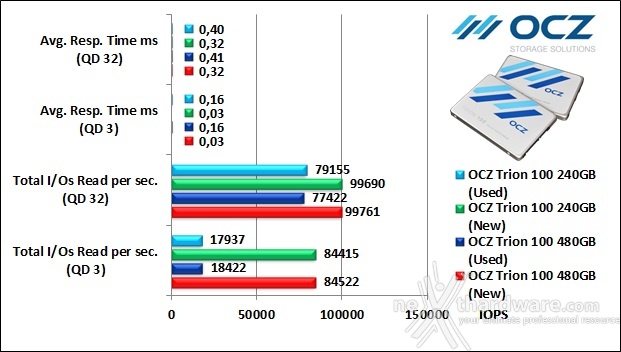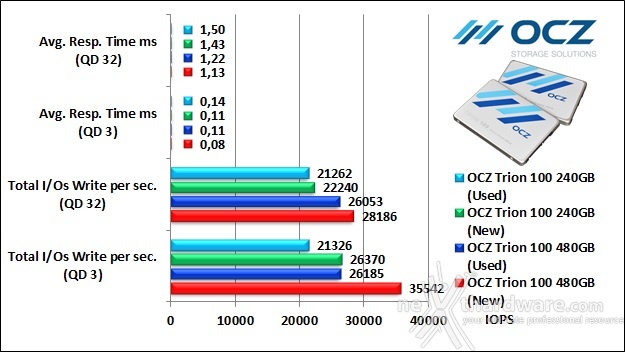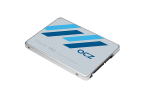10. IOMeter Random 4kB
Risultati
| SSD New - Random Read 4kB (QD 3) |
| | |
| OCZ Trion 100 240GB | OCZ Trion 100 480GB |
| Â SSD New - Random Read 4kB (QD 32) |
| | |
| Â OCZ Trion 100 240GB | OCZ Trion 100 480GB |
| SSD Used - Random Read 4kB (QD 3) |
| | |
| OCZ Trion 100 240GB | OCZ Trion 100 480GB |
| Â SSD Used - Random Read 4kB (QD 32) |
| | |
| OCZ Trion 100 240GB | OCZ Trion 100 480GB |
| SSD New - Random Write 4kB (QD 3) |
| | |
| Â OCZ Trion 100 240GB | OCZ Trion 100 480GB |
| SSD New - Random Write 4kB (QD 32) |
| | |
| OCZ Trion 100 240GB | OCZ Trion 100 480GB |
| SSD Used - Random Write 4kB (QD 3) |
| | |
| OCZ Trion 100 240GB | OCZ Trion 100 480GB |
| SSD Used - Random Write 4kB (QD 32) |
| | |
| OCZ Trion 100 240GB | OCZ Trion 100 480GB |
Sintesi


Nel test di lettura random 4kB con QD 32 entrambe le unità in prova riescono agevolmente a superare i dati di targa arrivando a sfiorare 100.000 IOPS a drive vergine e poco meno di 80.000 IOPS nelle condizioni di massima usura.
Utilizzando una Queue Depth pari a 3 i risultati a drive vergine si attestano a circa 84.000 IOPS, salvo poi crollare a meno di 20.000 a drive usurati.
Nella prova di scrittura siamo ben lontani da quanto dichiarato dal produttore sia per il Trion 100 240GB, che si ferma a poco più di 22.000 IOPS, sia per il Trion 100 480GB, che raggiunge quota 28.000 IOPS.
In QD 3 i risultati sono leggermente superiori a drive vergine, ma si riducono al livello dei precedenti valori in condizione di drive usurato.
Grafici comparativi SSD New


Nel grafico comparativo inerente la prova di lettura random 4kB QD 3 gli OCZ Trion 100 240GB e 480GB riescono a piazzarsi, rispettivamente, al secondo e primo posto con un buon margine sul resto del gruppo.
Utilizzando una Queue Depth pari a 32 la situazione cambia lievemente ed entrambe le unità si posizionano nella zona medio/alta della classifica, con un lieve distacco dai primi.


La classifica comparativa dei test in scrittura random ci conferma la scarsa velocità manifestata in precedenza dalle unità in prova, che accusano un notevole distacco anche in termini di IOPS. Â
| Steady State Performance Test |
| | |
| OCZ Trion 100 240GB | OCZ Trion 100 480GB |
Per avvalorare quanto affermato circa la superiorità delle proprie soluzioni rispetto alla diretta concorrenza nel contenimento del calo prestazionale dopo un utilizzo intensivo, OCZ ha indicato come affidabile una particolare combinazione di test denominata "Steady State Performance".
Per entrambe le unità in prova il produttore dichiara una velocità 3.200 IOPS ma, come si evince dagli screenshot in alto, il Trion 100 480GB ha mostrato di saper fare molto meglio dell'unità meno capiente arrivando a superare i 4.300 IOPS.
Sono comunque valori molto distanti dai 18.900 IOPS visti sull'ARC 100 240GB, che si trova appena un gradino più in su nel listino del produttore californiano.
Vogliamo ricordare che per dare il giusto peso a questo risultato, va tenuto debitamente conto della velocità di partenza che, nel nostro specifico caso, è già notevolmente bassa.









